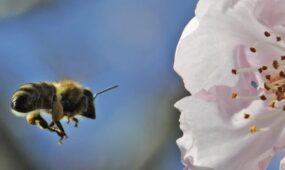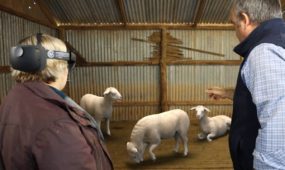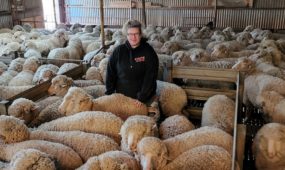Green thumbs up for plant research centre
Primary Industries
A WORLD-leading plant research centre in Australia is helping develop effective crop production strategies across the globe.

Sign up to receive notifications about new stories in this category.
Thank you for subscribing to story notifications.
The Plant Accelerator is a state-of-the-art research facility in Adelaide, South Australia, which studies the physical and biochemical traits of various plants.
It is the largest institute of its kind to allow outside access for international organisations and its automated processes speed up studies, monitoring thousands of plants a day.
A team of researchers led by King Abdullah University of Science and Technology (KAUST) in Saudi Arabia recently used the Plant Accelerator to discover a rice gene that helps it grow in salty conditions.
A number of researchers from the University of Adelaide and University of South Australia were also involved in the study.
Scientific Director at The Plant Accelerator Bettina Berger said the discovery of the gene meant it had the potential to be extracted and transferred to other varieties.
“Having the Plant Accelerator means we don’t have to kill the plants, cut them off, put them on scales and weigh them, which is what traditionally you had to do,” she said.
“We grew over 500 genotypes of rice for this study and looked at the one that grew best under salt, ultimately finding the gene that was more salt tolerant.
“It still needs to go into field trials but it would be possible to use rice as a model plant for other cereal plants such as wheat and barley, to see if the same gene is present there and if it has the same effect.”
The Plant Accelerator consists of several kilometres of conveyor belts where plants sit in little carts and travel around getting photographed and measured.
It has been in operation since 2010 and has assisted universities and research organisations from around Australia and the world.
The facility studies up to 2400 plants a day and uses a range of different cameras to measure temperature, water absorption, colour, shoot mass, size, health and physical traits of plants.
It also automatically weighs each plant, measuring and recording its growth over time.
For the KAUST study, two diverse sets of rice (indica and aus), along with hundreds of varieties in each set, were grown under low and high salinity. They were then photographed daily over 13 days to monitor biomass and shoot development.
It showed that some genes were important to growth in the first two to six days, while other genes became prominent later.
The researchers found the indica lines fared better than aus, leading the team to uncover significant genetic differences between the varieties.
Combining data on relative growth rate, transpiration rate and transpiration use efficiency means researchers can search for genetic activity related to specific plant traits.
Rice is a staple food for more than half of the world’s population, yet it is also the most salt-sensitive cereal crop.
According to Statista, more than 470 million tonnes of husked rice was produced in the past two harvesting years worldwide.
China is the world’s leading rice producer, growing more than 200 million tonnes a year, while India is the country with the largest area where rice is harvested.
“Providing high-quality research infrastructure, such as The Plant Accelerator, enables scientists in Australia and around the world to study novel aspects of crop tolerance to stress, which often require measurements over time instead of single time points,” Dr Berger said.
The Plant Accelerator is the headquarters of the Australian Plant Phenomics Facility and funded under the National Collaborative Infrastructure Strategy.
It houses about 20-25 projects a year, including international studies from around the world.
“Thanks to the unique Plant Accelerator facility at the Waite campus, we could analyse numerous aspects of the growth of multiple plants simultaneously,” says project leader Mark Tester from KAUST’s Centre for Desert Agriculture.
The study was published online in the journal Nature Communications.
Jump to next article



